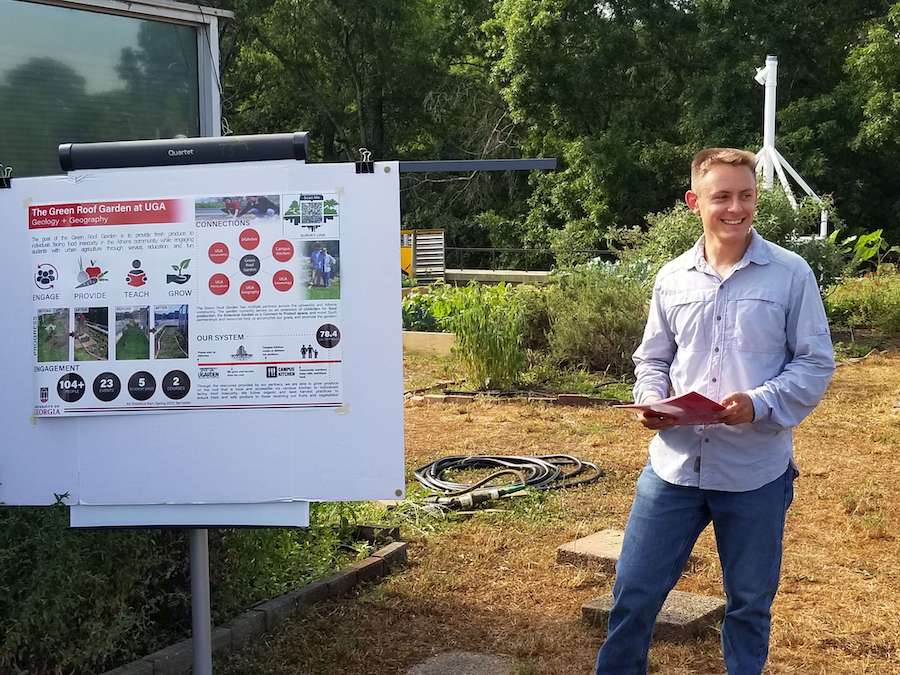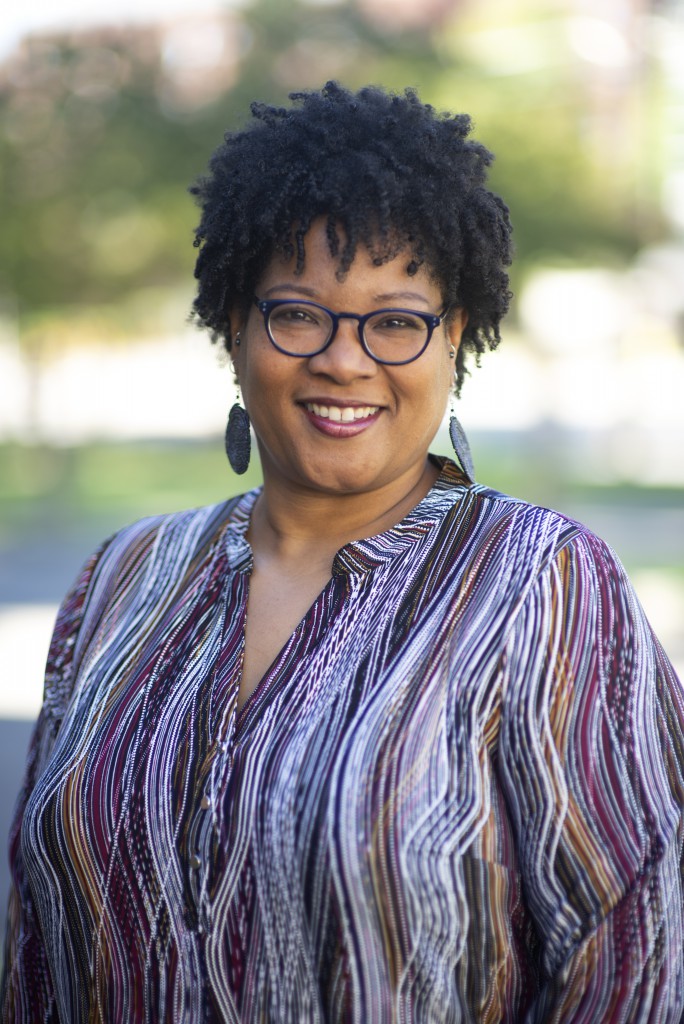
On the green roof garden of the University of Georgia Geography-Geology Building, Amy Sidran harvested kale and kohlrabi, scattered cover crop seeds and peppered green roof manager and graduate student Andrew MacElroy with questions about the uses of the space and how it is integrated with learning.
Sidran, farm education coordinator at The Hotchkiss School in Lakeville, Connecticut, was at UGA attending the joint AFHVS/ASFS Cultivating Connections: Exploring Entry Points into Sustainable Food Systems conference hosted by UGA’s Sustainable Food Systems Initiative May 18 to 21, the first time the conference has been held in the Southeast.
A slate of pre-conference tours on May 18 included the “How Local Education and Food Systems Collaborate” tour, during which Sidran and fellow attendees visited UGA spaces and community partners that are integral to sustainability and agricultural education at UGA and in the greater community.
At the Franklin Residential College, rising second-year student and inaugural Franklin Residential College sustainability chair Tiffanie Torrey showed off the raised-bed garden established by students at the dorm, explaining how the student-maintained space produced much more than fresh vegetables for residents to enjoy.
“We wanted people to feel invited to work in the garden. Even if they have no experience with gardening, students can come and enjoy the garden and relax,” said Torrey, adding that she set up a watering schedule so community members could gather around the garden during the spring semester. “We’d talk while we were watering and it gave community members another way to connect.”
Other stops during the day included a tour of the student-run UGArden, complete with a “Chopped” style cooking challenge using produce from UGArden and facilitated by student interns with UGA Campus Kitchen, which partners with UGArden to provide fresh produce, grocery bags and prepared meals to underserved members of the Athens community through nonprofit partner organizations.

The tour concluded at Barrow Elementary School, located in the heart of UGA’s campus, where school garden coordinator and teacher Sara Clarke demonstrated garden-themed lessons developed for each grade level at the school. She recommended a variety of age-appropriate books and resources for teachers working in farm-to-school and school gardening programs.
Throughout the Cultivating Connections conference, members of the Agriculture, Food and Human Values Society (AFHVS) and the Association for the Study of Food and Society (ASFS) attended panel discussions, poster presentations and learning sessions on topics in agricultural education, food systems, culture and research. The conference, which was originally planned for 2020 but postponed due to the pandemic, had more than 500 attendees, both virtually and in person. Participants came from all over the U.S. and abroad, including from Europe, Africa and Australia.
Monica M. White, founding director of the Office of Environmental Justice and Engagement at the University of Wisconsin-Madison, gave the keynote speech, called "Black Farmers, Black Scholars, Black Futures."
White recounted summers spent on her grandparents’ farms in North Carolina and Alabama.
“My great granddaddy James Brown owned land in Eden, North Carolina, and he passed that land down to my granddaddy Kenneth and my grandma Pearl, where they raised my mother and her seven siblings,” she said. “And although my parents were part of the northern migration, every summer we spent down South.”
On that farm, in the front of the family home, her grandparents ran a community store where people would gather to talk. As an academic years later, White reflected on those experiences and reached out to family to learn more.
“It was really interesting because it was the front of the house and people would come there all the time. I became fascinated by this. I was interested in not just what they did as farmers, but also the story of the store, especially in Rockingham County, which was known for high Klan activity during that time,” White said.
Through her aunt, White learned that her grandfather and other Black farmers started the store as place for the Black community to gather and buy what they needed in safety.
“I had just written 'Freedom Farmers.' I had written the whole book. It was under review and in last revisions, and I found out that I had written a book about my granddaddy and eight other farmers who pooled their resources together to create the community store. A place where Black folks could go be respected be honored and get what they needed,” she said. “The reason that I bring this up is because I think we all have an opportunity to look into our own story and find out why we study what it is that we study.”
By exploring the role of agriculture — both on traditional farms and in community gardening cooperatives developed to improve food security in underserved urban areas — White said there can be greater understanding of the role of alternative food systems in the fight for Civil Rights and economic freedom in communities of color.
.jpg)
“I wanted to understand that, but there was really not much scholarship before mine that helped me to understand the importance of Black farmers to our freedom history. This was not just important to our past, but also our future,” she said.
White’s hopes her research on the contributions of Black farmers to the Black freedom and Civil Rights movements expands understanding of agriculture as a resistance strategy.
“We're familiar with marches, protests and boycotts, and it is sometimes really important to do those things, but I felt like the social movement scholarship, especially in the discipline of sociology, was limited to the social movement — protest marches and boycotts — and that is not all there is,” she said. “When you think about protest marches and boycotts, all of that energy is directed toward those who you identify as a source of your oppression and exploitation. But what are you doing in in the meantime as you're also fighting those structures? How are you also creating the kinds of lives that you want?”
Using the example of freedom farmers and community organizations such as the Detroit Black Community Food Security Network, White said, “Agriculture offers us a different lens and a way to look at what we're doing and to expand those definitions of how we do use food production as a strategy of resistance.”
“We often talk about self-determination, especially in Black power spaces and Black studies spaces, as if the self is most important. But how do you explain the ways a community comes together and converts a vacant lot into a community growing space or community art without understanding and appreciating the community component or element of it?” she asked. “We often don't talk about intergenerational activism and how those messages are passed from one generation to the next. When you can feed yourself, it creates all kinds of other political options.”
Jennifer Jo Thompson, head of the Social Sustainability of Agrifood Systems Laboratory in the UGA College of Agricultural and Environmental Sciences Department of Crop and Soil Sciences, led the UGA planning committee for the Cultivating Connections conference with Assistant Professor Jerry Shannon and Professor Hilda Kurtz in the UGA Department of Geography and Associate Professor Abigail Borron and graduate assistant Gigi Gonsalves in the UGA Department of Agricultural Leadership, Education, and Communication.
“Our conference theme, Exploring Entry Points into Sustainable Food Systems, was motivated by the rich, diverse and fraught legacies of food and agriculture that have shaped this region — through enslavement and exploitation, as well as resistance and social activism,” Thompson said. “In reflecting on this history, we aimed to showcase the dedication of local farmers, chefs, entrepreneurs and community activists who have been working on the ground for years, and sometimes generations, to make food systems more equitable, accessible and healthy for people, communities and the environment.”






